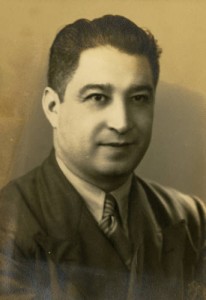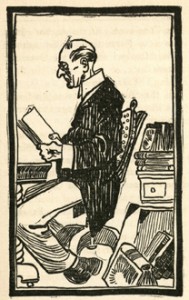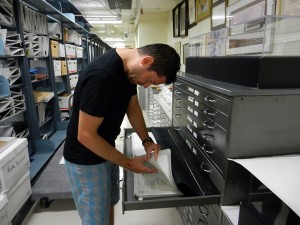
The following piece appears courtesy of Dan Johnson, 2013 Mosaic Fellow, wherein he provides a look at a sampling of projects benefiting from his internship with the University of Houston Special Collections.
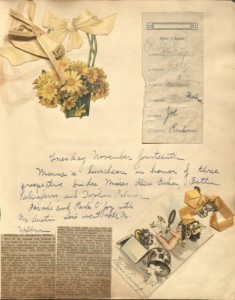
A full dance card (Gladys Ewing’s 1911 Houston Society Scrapbook, The Ewing Family Papers)
I was selected as a Mosaic Fellow in the Fall of 2013 by the Association of Research Libraries and the Society of American Archivists. I’m presently a MSLS student at the University of North Texas, studying Archival Studies and Digital Image Management. The Mosaic Fellowship included an internship component, pairing up fellows with host ARL institutions; I was glad to have the opportunity to intern here at UH Special Collections since September 2014. I’ve since had the pleasure of working on a variety of special projects, working hands on with archival materials.
I first started a digital audit of the Ewing Family Papers, comparing the physical archival collection to its finding aid and existing digital collection. In that review of the Ewing family scrapbooks, I worked with Valerie Prilop, Digital Collections Librarian, and we discovered that the finding aid for one of the scrapbooks provided descriptions for only the front side of each scrapbook page, but did not describe the reverse side, while the digital collection had page-level descriptions for both front and back sides of the pages. Ultimately, we were able to identify places where the finding aid could be improved, and we made some recommendations to combine two digital collections, one per scrapbook, into a single consolidated digital collection, a project for a later date.
I then started a project under the guidance of University Archivist Mary Manning, processing and describing additions to the William C. Moffit Papers. The collection was originally donated by Dr. Moffit himself, but several additions were later donated by his wife and family after he passed away. I was able to process and describe some additional manuscript parts, published musical arrangements, and Patterns of Motion training materials, among other things. Working with a member of the faculty from the School of Music who was intimately familiar with Dr. Moffit’s work helped me better describe and arrange the materials in a way that will make the most sense to researchers using this collection.
I started work on a third project with Hispanic Collections Archivist Lisa Cruces, auditing the physical material of the Alonso S. Perales Papers and comparing the physical archival collection to the finding aid. There were a handful of items in the physical collection that were not reflected in the finding aid, and I have been correcting the finding aid to more faithfully represent the collection.
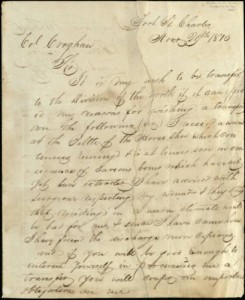
Request for transfer to a unit in the north signed by Sam Houston (November 29, 1813, Early Texas Documents Collection)
Most recently, I’ve been given the opportunity to work with Librarian Emerita Pat Bozeman on a project transcribing and contextualizing some handwritten letters. Two of these items were taken from the Early Texas Documents collection. One item is a letter from Sam Houston written after he was wounded in the Battle of Horseshoe Bend. It documents his request to be transferred from New Orleans to a more northern location upon the advice of several physicians. Another item is a letter that highlights Stephen F. Austin’s efforts to gather support from the United States government and people for Texas Independence and was written in Nashville, Tennessee days before Texas declared independence from Mexico. Working intimately with historical documents such as these has been a very exciting and rewarding experience.
The following comes to us courtesy of Julia Taylor, Graduate Fellow of the Carey C. Shuart Women’s Archive and Research Collection.
While Friday’s SCOTUS ruling on marriage equality marks a milestone in the struggle for LGBTQIAP rights, Special Collections’ booth at this year’s Houston Pride documented the genealogy of LGBT activists who set the stage for this historic win.
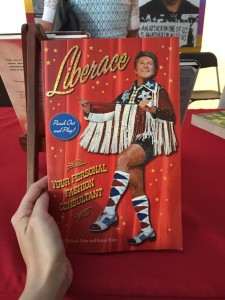
Edward Lukasek’s copy of Liberace: Your Personal Fashion Consultant, a book of Liberace paper dolls emblazoned with life mottos, was a crowd-pleasing favorite.
This year’s Pride festival and parade took place in downtown Houston instead of the usual shady Montrose locale, making the air-conditioned atmosphere of the LGBT History tent a welcome respite from the Texas heat. Special Collections proudly exhibited rare books and artifacts from the Edward Lukasek Gay Studies Collection and the Norma Lee Gay Studies Collection, as well as papers and ephemera from the Houston Area NOW Collection, the Debra Danburg Papers, and the Kanellos Latino Literary Movement Book Collection. Library staff and volunteers stood by to answer questions and show support as families, couples, and friends perused the display of historical and literary materials.
The LGBT history tent, which was sponsored by AT&T, also housed exhibits from Rice University Special Collections, the Botts Collections of Lesbian, Gay, Bisexual, and Transgender History, the Houston Public Library, and the Old Lesbian Oral Herstory Project. To learn more about the history of Houston Pride, visit their website.
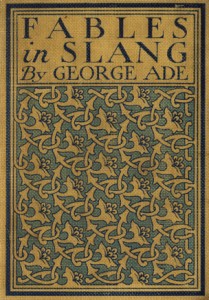 In addition to the over 7,000 linear feet of archival collections made available for study at the University of Houston Special Collections, we are also proud to offer over 100,000 rare and antique books for use in our reading room. Each month we highlight a text from our collections and what makes it so special. This month’s selection is contributed by Library Specialist for Liaison Services and Curator for the new Unique Holdings brown bag lecture series, Kristine Greive.
In addition to the over 7,000 linear feet of archival collections made available for study at the University of Houston Special Collections, we are also proud to offer over 100,000 rare and antique books for use in our reading room. Each month we highlight a text from our collections and what makes it so special. This month’s selection is contributed by Library Specialist for Liaison Services and Curator for the new Unique Holdings brown bag lecture series, Kristine Greive.
George Ade’s Fables in Slang is a collection of satirical fables with titles like “The Fable of the Martyr who Liked the Job” and “The Fable of the Professor who Wanted to be Alone.” Originally published in a Chicago newspaper, these tales mock all the personality types of late nineteenth century America. Even better, the fables are thoroughly illustrated in a bold, exaggerated style, and each ends with a sarcastic moral. In “The Fable of the Man who Didn’t Care for Story-Books,” for example, a man decides that contemporary literature is “all a mockery,” describing all the literature he has read and found lacking. The story concludes with the moral that “Only the more Rugged Mortals should attempt to Keep Up on Current Literature.”
Read a few of Ade’s fables and you’ll join a group of admirers that stretches back over a hundred years. Ade was enormously popular in the early twentieth century; in fact, the advertisement for his other books in the back of Fables in Slang asserts that “Mr. Ade’s books are too well known to require comment here.” He had influential fans, too: Taft held his first presidential campaign rally at Ade’s home, and Theodore Dreiser so admired Ade’s gift for description he even lifted a passage from his fables for use in the original edition of Sister Carrie. In his book on Ade, Lee Coyle locates a passage in the letters of Sir Walter Alexander Raleigh calling Ade “the greatest living American writer, ” an assertion that, while controversial even then, illustrates the name recognition Ade enjoyed in his time. He may not be as well known today, but Ade is forever being rediscovered, with periodic new editions of his works.
Fables in Slang was also recently discussed in The Last Untapped Resource in Houston, the first brown bag lecture in the Unique Holdings series highlighting rare books in our collection. The next event is April 22 and will feature life science books, ranging from centuries old illustrations of mythological animals to contemporary fine press books. In the meantime, why not come to the Special Collections Reading Room and read some fables? Just ask for call number PS1006.A6 F3 1900.
Today we have a goodbye post from Bryan Bishop ’14, the department’s first Instruction Support Student Worker. During his year in the position, he prepared rare materials for class visits, maintained the Evans Room (our classroom and function space), input student learning assessment data, digitized materials requested by patrons, and created descriptive metadata for a collection of World War II photographs.
A graduate of the UH Honors College in History and Political Science, Bryan is heading to Fonville Middle School in H.I.S.D. to teach U.S. History for the 2014-15 school year. He has also been accepted into the John W. Draper Master’s Program in Humanities and Social Thought at NYU with a deferred start date. All of us will miss Bryan’s intellectual curiousity, “can do” attitude, and sense of humor. Heeeeeere’s Bryan!
When I happened upon the Instruction Support position available in Special Collections last August, I had no idea what “instruction support” was, or that it would be the best job I ever had. As an older student worker I had had a few jobs prior to arriving at UH. But those jobs levied tremendous pressure, rarely yielding pleasure. This job was different. All that would be asked of me was to show up ready to work, complete thoroughly what was asked of me, and display passion for my projects, most of which involved research relating to my studies and interests: humanities and social sciences. Strange as it may sound, in 20 years of working this was the first time I was unconditionally happy.
Performing tasks around the department was a riot. True, I too have never associated riots with libraries. If anything, life surrounding a library is the complete opposite, serene. So how was working in Special Collections a riot? It was a riot in the sense of how I felt while and after performing my duties; that everything I did was significant for our university community and a team I hold in the highest regard—my co-workers, my friends. This, admittedly, is a peculiar illustration; however, I find that the more idiosyncratic a description is, the more unique, and in this case, special, the experience was.
I could utilize more space than the Interwebs have allotted to express my gratitude vis-à-vis the projects on which I was allowed to work. Ergo, I must devote my closing thoughts to my peers and managers in the department.
Okay, done.
The following comes to us courtesy of Ryder Kouba, exiting University Archives Fellow here at the University of Houston Special Collections. After a year and a half of service to the University, Ryder has accepted the position of Digital Collections Archivist in the University Archives at the American University in Cairo. We wish Ryder all of our best!
In August 2012 I joined the staff of Special Collections as the University Archives Fellow. Fresh out of the University of Texas’ School of Information, I was excited to return to my hometown of Houston to help preserve and make accessible the unique history of UH. Working at UH for the past 18 months has been a very rewarding experience, both professionally and personally.
My tenure began with a fun project documenting the history of the venerable Robertson Stadium before it was torn down in the fall of 2012. To create an exhibit covering the multiple uses of Robertson over the years required background research into notable events, what materials we had in our collections, and reaching out to departments around campus and individuals in the community.
A focus of my time was creating policies and procedures for the University Archives and Special Collections with Mary Manning, the University Archivist. An important aspect of documenting the university’s history is acquiring the appropriate materials; to that end Mary and I created transfer policies and guidelines for departments on campus as well as for private individuals, such as alumni. Standardizing these processes will allow Mary to acquire materials more efficiently from a wide variety of organizations and people.
Establishing guidelines for accessioning born-digital materials was the largest project I worked on, and I feel like the most valuable. When I arrived the University Archives had over 600 CDs, which as anyone who has scratched one can attest, are not the most durable of media. Creating policies and procedures from scratch was an intensive process of researching the fundamentals of preserving born digital materials (which UT had given me a solid foundation in) and seeing what other institutions were doing. After much work fine tuning our procedures, experimenting with software, and sharing it with fellow staff members, I’m happy to report that most of the 600+ CDs have been moved to storage on our servers.
I have been lucky that UH has been very supportive in my professional development; I’ve been able to attend conferences and workshops, particularly regarding digital practices, and bring my newfound knowledge back to UH. I was also able to present a case study of our development of policies and procedures at the Society of Southwest Archivists conference in 2013.
The end of my time at UH began as it started; working on an exhibit that Mary is putting together showcasing the history of Frontier Fiesta, one of UH’s most notable traditions. Overall, it’s been a wonderful year and a half for me, and Special Collections as well. I’ve provided professional level staffing to process university records, create policies and procedures, and showcase university archives holdings through exhibits. I have also been able to serve the entire library through committee work and serve both the university and community through providing reference services and outreach.
I will miss my colleagues in both Special Collections and M. D. Anderson Library and look forward to hearing about the exciting growth of the library and university in the coming years.
